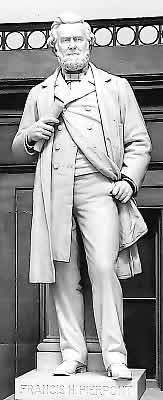Francis Harrison Pierpont

Francis Harrison Pierpont (born January 25, 1814 in Morgantown , Monongalia County , Virginia , † March 24, 1899 in Pittsburgh , Pennsylvania ) was an American politician and governor of the state of Virginia from 1865 to 1868 .
Early years
Francis Pierpont grew up in the western part of the state of Virginia in what is now Marion County ( West Virginia ). He remained associated with this area for the rest of his life. He attended Allegheny College in Pennsylvania. He then worked as a teacher in Virginia and Mississippi . After studying law he was admitted to the bar in 1842, whereupon he began to work in his new profession in Fairmont . In 1848 he also became legal representative for the Baltimore and Ohio Railroad . In 1854 he also got into coal mining. Pierpont was a co-founder of the Fairmont Male and Female Seminary , which later became Fairmont State University .
Political rise
Pierpont was a staunch opponent of slavery and became a member of the newly formed Republican Party . In 1861 he supported President Abraham Lincoln and unsuccessfully opposed Virginia's exit from the Union. He was a delegate at the Wheeling meetings preparing the secession of West Virginia. There, before the founding of West Virginia, a counter-government to the Confederate government of Virginia was established in Richmond and Pierpont was elected counter-governor to Confederate Governor John Letcher .
As a result, Pierpont campaigned for the establishment of the new state of West Virginia. This took place in 1863. Arthur I. Boreman was elected the first governor of the new state . At the same time, Pierpont became governor of the Union-controlled restored state of Virginia . Its capital was Alexandria until the end of the Civil War because Richmond was still controlled by the Confederates and was even their capital.
Governor of Virginia
After the end of the war, Francis Pierpont was officially re-elected Provisional Governor of the State of Virginia by President Andrew Johnson . The capital was moved back to Richmond on May 24, 1865. Pierpont was governor of Virginia between April 1, 1865 and April 4, 1868. This time was marked by the consequences of the war. Politically, he did not succeed at that time in getting the legislature to accept the 14th amendment to the constitution .
In 1867 and 1868 Pierpont was instrumental in drafting a new state constitution for Virginia. According to the federal government's new reconstruction law , Pierpont was deposed in 1868 by military commander General John Schofield and replaced by Henry H. Wells .
Another résumé
After his governorship, Pierpont left Virginia and moved to West Virginia, where he worked as a lawyer. In 1870 he was elected to the West Virginia House of Representatives for one term . He was also a co-founder of the Historical Society of West Virginia . His last official position was from President James A. Garfield , who appointed him head of the Federal Treasury in West Virginia in 1881. Francis Pierpont died in his daughter's home in Pittsburgh in 1899 and was buried with military honors in Fairmont. He was married to Julia Augusta Robertson, with whom he had two children.
Web links
| personal data | |
|---|---|
| SURNAME | Pierpont, Francis Harrison |
| BRIEF DESCRIPTION | American politician |
| DATE OF BIRTH | January 25, 1814 |
| PLACE OF BIRTH | Morgantown , Virginia |
| DATE OF DEATH | March 24, 1899 |
| Place of death | Pittsburgh , Pennsylvania |
